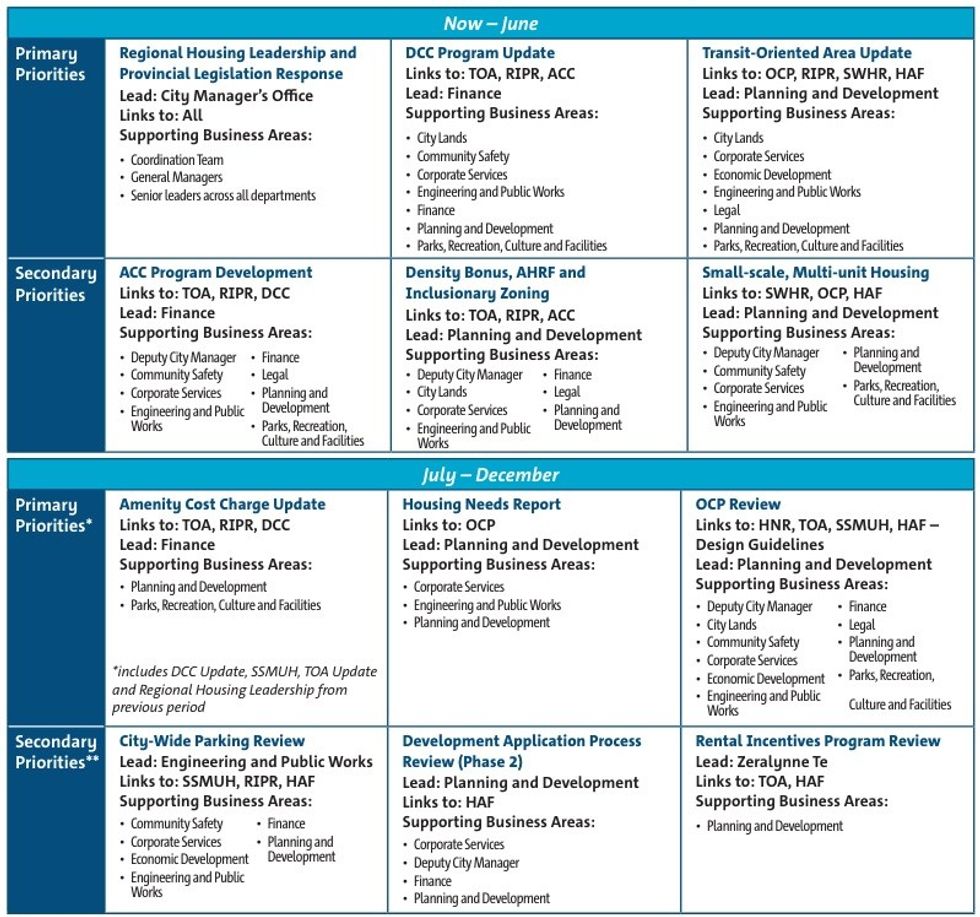In life, tensions can often arise from how you do something more so than what it is you're actually doing. That is the gripe the City of Coquitlam has, in a nutshell, with the Province.
This past fall, the Province introduced several pieces of legislation focused on housing and development, namely those pertaining to small-scale multi-unit housing (SSMUH), development financing, and transit-oriented development areas, which are, respectively, Bill 44, 46, and 47.
It's one thing to introduce a bunch of legislation all at once, but it's another to set concurrent deadlines for local governments to implement all those changes, and it's yet another to do all of the above without much prior consultation with local governments.
That's where the City of Coquitlam's gripes begin.
A "Haphazard" Start
As STOREYS previously reported, different local governments learned about the incoming legislation at different times.
"I think that's part of the problem, here," says City of Coquitlam City Manager Raul Allueva. "People learned about it at different times, the engagement was very haphazard, and it really wasn't meaningful and collaborative consultation. I think you'd probably find that across the board. The Province had people under non-disclosure agreements and, quite frankly, nobody really got the full picture. They might involve a staff member here, a staff member there, but when the legislation dropped, it was a complete shock, in terms of the depth of it, the scope, and the lack of supporting regulation."
"I don't fault the intent [behind the legislation]," Allueva added. "I feel that our city has been progressive in terms of developing housing for a decade and we've been pushing housing out at a level that is as high as any municipality, but we've been highly impacted by this because, like everybody else, we have to fit under this structure that the Province has set. It would've been nice to have more engagement and consultation, which would have allowed us to not always have to be on the backfoot trying to figure something out. It would've absolutely been more helpful."
Again, this would not be much of a problem were it not for the deadlines that were set alongside each legislation announcement, which resulted in local governments having the deadlines before they had the policy guidance they needed to do the work to meet those deadlines.
"They drop the legislation and then there's deadlines, but the legislation really doesn't specifically have regulations or policies attached to them. Those followed months later, so you can see what happens: they drop three bills, there's deadlines attached to them, but we don't have regulations, and they drop the regulations months later, but the deadline is already moving, then there's policy material that gets dropped months after that, then another bill gets dropped — Bill 16 [regarding inclusionary zoning, which was dropped in April]."
City Projects Get Sidelined
As Coquitlam's City Manager, Allueva, who has been with the City for over a decade across various roles, says this made it very difficult to figure out how to allocate staff and resources, as well as how to proceed with the implementation work versus the City's own work.
Last week, City staff presented their "Corporate Strategy to Respond to Provincial Legislation" to Council, outlining a plan to deal with these things, which Allueva calls "the biggest pivot we've had to do, administratively, since COVID."
"The impact of wide-ranging Provincial changes on City business is far encompassing, necessitating involvement and resources from all departments and staff believe there will be unavoidable delays to some items on the 2024 Business Plan, as well as other operational business that the City typically undertakes," said staff in a report outlining the corporate strategy.

According to the report, some of the City's own work that has had to be put on the back burner include work pertaining to its Climate Action Plan, Financial System Modernization, Major Facilities Roadmap, Strategic Transporation Plan, among others. Those projects are expected to be delayed through 2024, with several others expected to be deferred to 2025, including work on the Heritage Management Strategy, Hazel/Coy Neighbourhood Plan, Burke Mountain Village Development Planning, Blue Mountain Park Master Plan, and Glen Park Phase 3 Planning, among many more.
"I've had to suspend significant housing policy programs that could be achieving huge housing delivery, in order to do this small-unit stuff that, largely, isn't going to give us the kind of immediate housing delivery numbers," says Allueva. "I don't mind small units, but I have to direct half of the planning team to do this when they could be working on how to develop medium density projects across our city. But that's the provincial mandate and we have to do it. Again, I don't fault the idea behind it, but so much of it is how you do it."
Staff Capacity and Financial Uncertainty
According to Allueva, approximately 15 to 20 staff members are dedicated almost exclusively to the work of implementing provincial legislation. The City report on the corporate strategy also notes that approximately 50 staff outside of the Planning and Development department, including many of the senior managers such as Allueva, have also been heavily involved in the work and have had to redirect their focus onto it.
To support this work, the City is also now looking to hire eight additional staff members, using funding provided by the Province specifically for this purpose ($879,175), as well as with funding through the federal Housing Accelerator Fund.
Looming over some of this and the City at large is the financial uncertainty, which could have significant trickle-down effects that have yet to be seen.
"Since early this year, Finance staff have been fully engaged to understand the implications of the Provincial changes on the City's Capital Funding Framework," staff said in the report. "This has included looking at options to restructure the existing development finance system. [...] The degree of uncertainty cast by the provincial legislative changes related to the development finance system cannot be understated. These changes have and will delay priority City projects as a new system of DCCs, ACCs, CACs, and density bonus is reconfigured to ensure that amenities are appropriately funded. Given all the changes, capital projects will likely need to be delayed, changed in scope, reimagined, or reprioritized until there is greater funding certainty or a new capital funding strategy has been contemplated by Council."
Allueva says that Bill 46, pertaining to DCCs, ACCs, and CACs, has been the most challenging to implement and that this has forced the City to reset its expectations on these projects and how to fund them.
Allueva recognizes that housing is one of the biggest issues of our time, but believes that the Province could have handled all of this differently. Instead, the work will now result in City projects being delayed, which impacts the residents of Coquitlam.
"We've just had a metal rod put into our spokes. Cities are having to rebuild and develop new systems, almost like rebuilding a plane as we're flying it. It's pretty chaotic."
- How Vancouver, Surrey, And Kelowna Are Handling BC's New Housing Legislations ›
- Inside The City Of Coquitlam As Developers Rush To Get Permits ›
- Coquitlam Outlines Rates For New Amenity Cost Charges Program ›
- Coquitlam Approves Temporary Density Bonus Discount ›
- Coquitlam Unveils Land Use Plan For Transit-Oriented Areas, Corridors ›





















